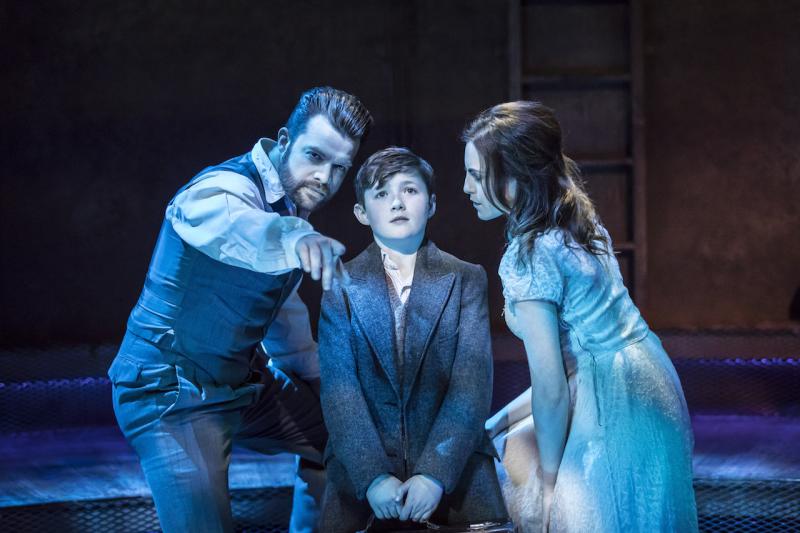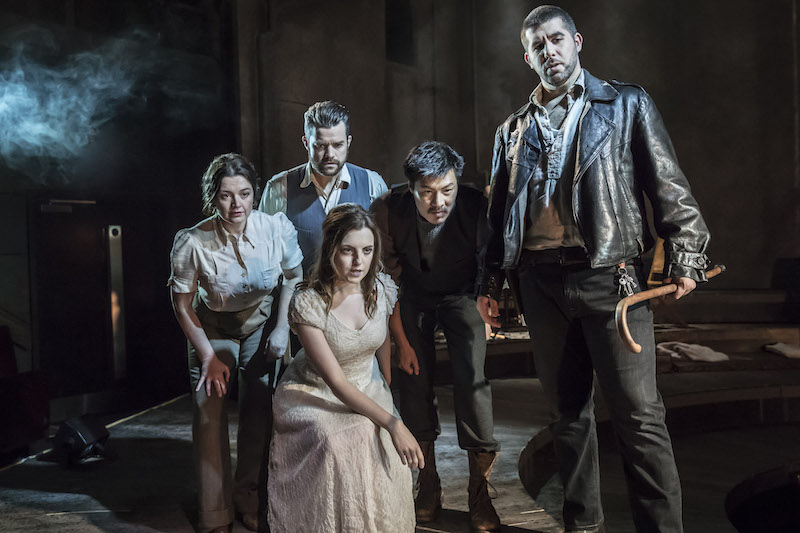Whisper House, The Other Palace review - 'a delicately calibrated human story struggling to be heard' | reviews, news & interviews
Whisper House, The Other Palace review - 'a delicately calibrated human story struggling to be heard'
Whisper House, The Other Palace review - 'a delicately calibrated human story struggling to be heard'
Scary? Not this ghost-story rock musical, sadly

It used to be said that the devil had all the best music. But the devil seems to have lost his touch in this ghost-story rock musical from Duncan Sheik, composer of the stage version of American Psycho and the award-laden Spring Awakening. If the plot seems familiar, it’s because it is – in essence, anyway. An isolated location. Childhood innocence in peril.
But the main problem with Whisper House, which premiered in San Diego in 2010 and here receives its European premiere, is the devil’s music itself. It’s the thumping beat, loud amplification and stroppy, stadium-gig stage manners that threaten to sink what is otherwise a perfectly sea-worthy, even intriguing, chamber-scale musical drama.
 The setting – Kyle Jarrow wrote the book and co-wrote the shockingly bland lyrics – is a lighthouse on the rocky coast of Maine in 1942. A boy, Christopher, arrives there to be cared for by his Aunt Lily, his pilot father having been lost in service and his mother to a mental institution. The crabby aunt (a classy, low-key performance from Dianne Pilkington) is the lighthouse keeper, and for 20 years has lived there alone but for a Japanese manservant (Nicholas Goh, another good, subtle performance) and occasional visits from Simon Lipkin’s testy Sheriff, who despite his rough manner and no encouragement seems to hold a candle for Lily, who has a club foot as well as a disinclination to chat.
The setting – Kyle Jarrow wrote the book and co-wrote the shockingly bland lyrics – is a lighthouse on the rocky coast of Maine in 1942. A boy, Christopher, arrives there to be cared for by his Aunt Lily, his pilot father having been lost in service and his mother to a mental institution. The crabby aunt (a classy, low-key performance from Dianne Pilkington) is the lighthouse keeper, and for 20 years has lived there alone but for a Japanese manservant (Nicholas Goh, another good, subtle performance) and occasional visits from Simon Lipkin’s testy Sheriff, who despite his rough manner and no encouragement seems to hold a candle for Lily, who has a club foot as well as a disinclination to chat.
Of course, the lighthouse is haunted. But Sheik throws away any chance of spooking us with the discovery by having his two ghosts introduce themselves squarely in the opening song, the blastingly un-nuanced “Better to Be Dead”. Little Christopher, apparently covering his ears to block out the ghosts’ appeals to him by name, might just be finding it all too noisy.
Too many songs are given to the ghosts, too few to the more interesting characters
It emerges that the doomy pair (Niamh Perry in Morticia Addams’ make-up and long white dress, Simon Bailey looking disconcertingly normal) were victims of a shipwreck in 1922 and, drowned before they could declare their love, have ever since been hell-bent on revenge, and loud and furious singing.
Striding around the circular well that represents the lighthouse (set, Andrew Riley), the dead pair cut absurdly vigorous figures, Perry sometimes breaking into a manic rock-chick skip, Bailey thrusting his hips and beating the air, never mind that both their characters met their demise in the era of the Charleston. Neither Sheik’s music nor Adam Lenson’s direction pay any heed to period, despite having taken the trouble of dividing the seven-piece band into halves: rock band to the right of the stage, winds and keyboard to the left. Balance isn’t the show’s strong suit. Far too many songs are given to the ghosts, too few to the more interesting characters. Yasuhiro, the servant, whose story becomes pivotal, doesn’t sing at all, the aunt and the Sheriff very little, and never together.
Whisper House is an oddity, that’s for sure. Even its title is odd: "Shouty House" would have been more apt. Yet beneath the crassness and high volume is a delicately calibrated human story struggling to be heard. If this really is the kind of experiment Andrew Lloyd Webber had in mind for his newly acquired venue (this is its second offering), then the box office may be in for a bumpy ride.
The future of Arts Journalism
You can stop theartsdesk.com closing!
We urgently need financing to survive. Our fundraising drive has thus far raised £49,000 but we need to reach £100,000 or we will be forced to close. Please contribute here: https://gofund.me/c3f6033d
And if you can forward this information to anyone who might assist, we’d be grateful.

Subscribe to theartsdesk.com
Thank you for continuing to read our work on theartsdesk.com. For unlimited access to every article in its entirety, including our archive of more than 15,000 pieces, we're asking for £5 per month or £40 per year. We feel it's a very good deal, and hope you do too.
To take a subscription now simply click here.
And if you're looking for that extra gift for a friend or family member, why not treat them to a theartsdesk.com gift subscription?
more Theatre
 Works and Days, Edinburgh International Festival 2025 review - jaw-dropping theatrical ambition
Nothing less than the history of human civilisation is the theme of FC Bergman's visually stunning show
Works and Days, Edinburgh International Festival 2025 review - jaw-dropping theatrical ambition
Nothing less than the history of human civilisation is the theme of FC Bergman's visually stunning show
 Every Brilliant Thing, @sohoplace review - return of the comedy about suicide that lifts the spirits
Lenny Henry is the ideal ringmaster for this exercise in audience participation
Every Brilliant Thing, @sohoplace review - return of the comedy about suicide that lifts the spirits
Lenny Henry is the ideal ringmaster for this exercise in audience participation
 Edinburgh Fringe 2025 reviews: The Beautiful Future is Coming / She's Behind You
A deft, epoch-straddling climate six-hander and a celebration (and take-down) of the pantomime dame at the Traverse Theatre
Edinburgh Fringe 2025 reviews: The Beautiful Future is Coming / She's Behind You
A deft, epoch-straddling climate six-hander and a celebration (and take-down) of the pantomime dame at the Traverse Theatre
 Good Night, Oscar, Barbican review - sad story of a Hollywood great's meltdown, with a dazzling turn by Sean Hayes
Oscar Levant is an ideal subject to refresh the debate about media freedom
Good Night, Oscar, Barbican review - sad story of a Hollywood great's meltdown, with a dazzling turn by Sean Hayes
Oscar Levant is an ideal subject to refresh the debate about media freedom
 Edinburgh Fringe 2025 reviews - Monstering the Rocketman by Henry Naylor / Alex Berr
Tabloid excess in the 1980s; gallows humour in reflections on life and death
Edinburgh Fringe 2025 reviews - Monstering the Rocketman by Henry Naylor / Alex Berr
Tabloid excess in the 1980s; gallows humour in reflections on life and death
 Edinburgh Fringe 2025 reviews: Lost Lear / Consumed
Twists in the tail bring revelations in two fine shows at the Traverse Theatre
Edinburgh Fringe 2025 reviews: Lost Lear / Consumed
Twists in the tail bring revelations in two fine shows at the Traverse Theatre
 Make It Happen, Edinburgh International Festival 2025 review - tutting at naughtiness
James Graham's dazzling comedy-drama on the rise and fall of RBS fails to snarl
Make It Happen, Edinburgh International Festival 2025 review - tutting at naughtiness
James Graham's dazzling comedy-drama on the rise and fall of RBS fails to snarl
 Edinburgh Fringe 2025 reviews: I'm Ready To Talk Now / RIFT
An intimate one-to-one encounter and an examination of brotherly love at the Traverse Theatre
Edinburgh Fringe 2025 reviews: I'm Ready To Talk Now / RIFT
An intimate one-to-one encounter and an examination of brotherly love at the Traverse Theatre
 Top Hat, Chichester Festival Theatre review - top spectacle but book tails off
Glitz and glamour in revived dance show based on Fred and Ginger's movie
Top Hat, Chichester Festival Theatre review - top spectacle but book tails off
Glitz and glamour in revived dance show based on Fred and Ginger's movie
 Edinburgh Fringe 2025 reviews: Alright Sunshine / K Mak at the Planetarium / PAINKILLERS
Three early Fringe theatre shows offer blissed-out beats, identity questions and powerful drama
Edinburgh Fringe 2025 reviews: Alright Sunshine / K Mak at the Planetarium / PAINKILLERS
Three early Fringe theatre shows offer blissed-out beats, identity questions and powerful drama
 The Daughter of Time, Charing Cross Theatre review - unfocused version of novel that cleared Richard III
The writer did impressive research but shouldn't have fleshed out Josephine Tey’s story
The Daughter of Time, Charing Cross Theatre review - unfocused version of novel that cleared Richard III
The writer did impressive research but shouldn't have fleshed out Josephine Tey’s story
 Evita, London Palladium review - even more thrilling the second time round
Andrew Lloyd Webber's best musical gets a brave, biting makeover for the modern age
Evita, London Palladium review - even more thrilling the second time round
Andrew Lloyd Webber's best musical gets a brave, biting makeover for the modern age

Add comment